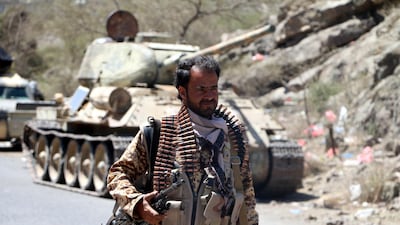A deadly battle between the Yemeni military and the Houthi militias has brought the government closer to securing Al Dhalea province between Aden and Sanaa, the Yemeni capital.
The Iran-backed Houthis have sent more than three brigades from the port city of Hodeidah to the province.
On the fourth day of the battle, the Houthis haved broken ranks on the Mers front, a crucial road leading from the interim capital of Aden to the north.
The clashes have killed five pro-government troops, who have also been reinforced by fighters from Hodeidah.
"We liberated the villages near Nasah mountain, which were recently controlled by the Houthi militia, and we have been imposing a strict siege around the mountain to control it in the coming few days," a high ranking commander told The National.
The battle comes as both sides negotiate a withdrawal from Hodeidah – a crucial step for a political solution to the civil war, which is now in its fourth year.
The Houthis are hoping to gain another victory in the provinces surrounding Sanaa. Last month, they regained control of areas in the north known as Hajoor.
“They think they could repeat the scenario of Hajoor but they will live very dark days here in Al Dhalea," said Lt Akram Al Kudahi, coalition spokesman on the front northern Al Dhalea.
"They have already experienced the battle in Al Dhalea, in 2015.”
Al Dhalea is symbolically important to government troops because it was the first region they liberated from the Houthis after the coup.
The Houthis' failure to adhere to a UN-brokered ceasefire and withdrawal from Hodeidah city has caused tension to flare up in parts of the country.
The UN said it continueD to pursue the ceasefire because it needs full access to Hodeidah and safe passage to the rest of the country if it is to provide aid to 14 million people on the brink of famine.
The war has exacerbated the humanitarian situation, which the UN claims is among the world's worst.
But the Houthis continue to take advantage of the ceasefire to gain advantage on the internationally recognised government's troops.
Meanwhile, the popular resistance forces backed by the government took the upper hand in the southern province of Ibb, the Saudi state news agency Spa reported.
The victories will allow the government to isolate Taez and Ibb from Sanaa, cutting off supply routes to the rebel-held capital.
At the Arab League Summit this week, Saudi King Salman stressed the importance of finishing the war in Yemen and countering Iranian support for the Houthis and other militias in the region.
Michael Lollesgaard, head of the Redeployment Co-ordination Committee overseeing the ceasefire deal, on Saturday met the gYemen government to address the withdrawal from the ports of Al Saleef and Ras Issa.
Mr Lollesgaard delegated the forces who would be responsible for securing the ports and monitoring the implementation of the withdrawal agreement expected to begin next week.
A final meeting is expected to take place between the government and Houthis on April 2 to determine the exact date of the withdrawal. But the violence continues in the port city.
Col Wathah Al Dubaish, spokesman for the joint forces in Hodeidah, said that the UN team was exposed to Houthi fire as they were heading to the meeting with government officials.

